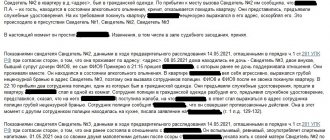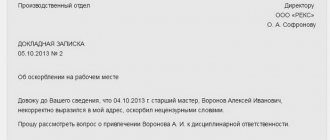Commentary to Art. 319 Criminal Code
1. The analyzed norm provides for liability for insulting government officials carrying out any legal activity, including during the administration of justice or conducting a preliminary investigation. At the same time, insulting a judge and a number of other persons in connection with the manifestation of contempt of court is qualified under Art. 297 CC.
2. The objective side - the action - is characterized by: a) humiliation of the honor and dignity of a specific representative of the government; b) affecting both personal and professional (official) dignity. The insult must be committed during the performance or in connection with the performance by a representative of the authorities of his duties; c) expressed in an indecent form, which is determined by the court in each specific case on the basis of moral standards; d) the variety of external forms of expression of insult (insult by words, actions, in a written message, etc.); d) publicity of insult. Publicity is determined either by the presence of outsiders during the insult, or by bringing the offensive message to the attention of third parties. The possibility of recognition by outside colleagues of an insulted government official is assessed ambiguously in the literature.
3. If the actions of the perpetrator contain signs of several simultaneously committed attacks on the normal activities of government officials in connection with the performance of their official duties, for example, insult and use of violence, committed, according to the established approach in judicial practice, is qualified under the article of the Criminal Code, which provides for liability for the most serious type of encroachment.
LEGISLATION EXPLANATION
Criminal liability under Art. 319 of the Criminal Code of the Russian Federation. Insulting a government official.
The object of this crime is the normal activities of government authorities. At the same time, the very insult of a government official affects his honor and dignity, which also causes harm. The public danger of insulting a government official is that this crime undermines the authority of government bodies, creates a climate of nervousness in the activities of their employees, affects their honor and dignity, thereby introducing disorganization into the work of government bodies. A representative of the government is recognized as an official of a law enforcement or regulatory body, as well as another person vested with administrative powers in relation to persons who are not officially dependent on him in accordance with the procedure established by law. Law enforcement agencies are government bodies entrusted by law with the function of combating crime and ensuring the rule of law. These include the prosecutor's office, internal affairs, the Federal Security Service, the Federal Border Service of the Russian Federation, the Foreign Intelligence Service of the Russian Federation, and customs. Other persons include officials exercising legislative or executive power, vested with the authority to make decisions binding on citizens who are not subordinate to them, as well as organizations regardless of their departmental subordination (members of the Federation Council, deputies of the State Duma, deputies of legislative government bodies of the constituent entities of the Russian Federation, members of the Government of the Russian Federation and executive authorities of the constituent entities of the Russian Federation, auditors in the public service, etc.). Honor refers to the public assessment of a person, relating to his moral, moral, spiritual, and social qualities. Dignity is the internal self-esteem of an individual from the position of his significance in society, a specific team, self-esteem of his mental, business, and moral qualities. A feature of the objective side of this crime is that insulting a government official must be public and committed during the performance of his official duties or in connection with their performance. Insult can be carried out in any way: verbally, by gestures, in writing, etc. The method of committing a crime does not affect the existence of a crime. Publicity of an insult means that information that humiliates the honor and dignity of a government official clearly does not correspond to generally accepted norms of behavior, grossly violates human dignity, and becomes available to many people, for example, from a public speech, a publicly displayed work, or from the media. Such performances can take place in front of an audience, on the street. All kinds of leaflets and appeals containing offensive information about a government official and posted in accessible places have the sign of publicity. In this regard, the Supreme Court of the Russian Federation recognized that there was no sign of publicity in G.’s actions, which excludes his liability under Art. 319 of the Criminal Code of the Russian Federation. In the case, it was established that G. expressed insults to police officer Kh. in the premises of a medical sobering-up station only in the presence of M., a nurse at a medical sobering-up station, and T., a paramedic of the same sobering-up station, and in the absence of other persons there. According to the Supreme Court of the Russian Federation, objective data indicating that G., by uttering insults that humiliated the honor and dignity of the victim, wanted to make them available to many people for the above purpose are absent from the case materials. Under such circumstances, the verdict against G. was overturned, and the criminal case was terminated due to the lack of corpus delicti in his actions. The corpus delicti is formal, and the crime is considered completed at the moment of uttering words of an offensive nature or other actions. The subjective side of the crime is characterized by direct intent. The person is aware of the socially dangerous nature of publicly insulting a government official, is aware that he is insulting a government official in connection with the performance of his official duties, and wants to do so. At the same time, the motivation for the insult will not matter for the offense of an official if it was inflicted during the performance of official duties. Insult in connection with the performance of official duties means the existence of a subjective connection between the actions of the victim as a representative of the authorities and the insult inflicted. Such an insult could be, for example, revenge for the activities of a government representative, an expression of dissatisfaction with such activities. Thirdly, the insult must be expressed in an indecent form. Indecent form means not only obscene language or obscene gestures addressed to a representative of the authorities, but also other forms that are in conflict with accepted norms of behavior in society, for example, spitting in the face, slap in the face, derogatory nickname, etc. The subject of the crime is a person who has reached the age of 16 -years of age.
Second commentary to Art. 319 of the Criminal Code of the Russian Federation
1. The objective side of insult is humiliation of the honor and dignity of a person, expressed in an indecent form. Article 319 of the Criminal Code provides for special signs of insult:
a) carrying out the specified actions in relation to a government official during the performance of his official duties or in connection with their performance;
b) the public nature of the insult. These objective signs of insult determine the specificity of the act as a crime against the order of government: it demonstrates disrespect not for an individual, but for the authorities (the person representing the authorities). The public nature of the actions (when they are committed in the presence of at least one more person besides the victim), in addition, undermines respect for authority in the minds of other people.
2. The criteria for assessing insult are ethical. But the ethics of communication between individuals (the ethics of the behavior of an individual) and the ethics of political communication, although they have common roots, are still significantly different from each other. To insult a government official, it is not necessary to commit actions that are indecent from the point of view of ordinary morality (for example, using obscene language). But ridicule of a person (his personal shortcomings) acting in an official capacity as a representative of the authorities is a deliberate lowering of not only his status, but also disrespect for the authorities in general. The offensiveness of such behavior will not lose its meaning even if the perpetrator used normative language.
3. The subjective side of this crime is characterized by direct intent.
4. Subject - a person who has reached the age of 16 years.
Article 319. Insulting a representative of the authorities
ECtHR ruling dated October 3, 2017 12. The applicant, being intoxicated, did not stop behaving aggressively even after the police officers warned the applicant about the illegal nature of her behavior. Since the applicant's actions constituted a public insult to a government official, an act punishable under Article 319 of the Criminal Code of the Russian Federation (hereinafter referred to as the Criminal Code of the Russian Federation), P. and T. asked the applicant to follow them to the police station to draw up a report. The applicant refused to comply with this demand and they took her hands to put her into the police car. The applicant resisted and tried to fall to her knees. At that moment, F. ran out of the house and kicked one of the policemen in the stomach. P. and T. were forced to stop F.’s aggression by using physical force and handcuffing him. They then took F. to the police station.
Appeal ruling of the Appeal Board of the Supreme Court of the Russian Federation dated 06/07/2018 N APL18-241
Davoyan Arthur Mnatsakanovich, born ... in the city ... of the Republic ..., accused of committing crimes under Art. Art. 319, 318 part 1 of the Criminal Code of the Russian Federation. Having heard the report of the judge of the Supreme Court of the Russian Federation Yu.V. Sitnikov, the speech of the accused A.M. Davoyan, his defense attorney S.V. Poddubny. in support of the arguments of the appeal, the speech of prosecutor Gurova V.Yu. about the absence of grounds for canceling and changing the court decision, Board of Appeal
Appeal ruling of the Judicial Collegium for Criminal Cases of the Supreme Court of the Russian Federation dated 06/04/2019 N 56-APU19-9
1. December 15, 2014 under Art. 318 part 1, art. 319 of the Criminal Code of the Russian Federation to 2 years of suspended imprisonment with a probationary period of 1 year; 2. July 6, 2016 under Art. 158 part 2 clauses “b”, “c”, art. Part 3, Art. 158 part 2 paragraph “b” of the Criminal Code of the Russian Federation to 2 years of suspended imprisonment with a probationary period of 2 years;
Appeal ruling of the Judicial Collegium for Criminal Cases of the Supreme Court of the Russian Federation dated May 30, 2019 N 67-APU19-5
Kolchunov Alexey Igorevich, ..., convicted on April 30, 2014 under Art. 319, paragraph “g”, part 2 of Art. 161 of the Criminal Code of the Russian Federation to 2 years in prison and a fine of 1,000 rubles, released on April 29, 2016 after serving the sentence,
Determination of the Judicial Collegium for Criminal Cases of the Supreme Court of the Russian Federation dated November 20, 2018 N 88-APU18-6
By the verdict of the Tomsk Regional Court dated June 8, 2022, P. was convicted under paragraph “i” of Part 2 of Art. 105 of the Criminal Code of the Russian Federation and Art. 319 of the Criminal Code of the Russian Federation. In the appeals, the convicted P. and his defense lawyer asked to reclassify P.’s actions from clause “i” of Part 2 of Art. 105 of the Criminal Code of the Russian Federation at Part 4 of Art. 111 of the Criminal Code of the Russian Federation, since there was a conflict between the convicted person and the victim, provoked by the victim himself.
Appeal ruling of the Judicial Collegium for Criminal Cases of the Supreme Court of the Russian Federation dated July 19, 2018 N 4-APU18-23
Rashchupkin Vladimir Aleksandrovich, ... convicted by the verdict of the Magistrate Judge of the Cheboksary District Court dated November 29, 2012 under Art. 119, part 1 art. 319 of the Criminal Code of the Russian Federation to punishment in the form of 350 hours of compulsory labor; the sentence has not been served, acquitted under Part 2 of Art. 209 of the Criminal Code of the Russian Federation on the basis of clause 2, part 1, art. 24 of the Code of Criminal Procedure of the Russian Federation for the absence of corpus delicti in the act, with the right to rehabilitation in this part;
Appeal ruling of the Judicial Collegium for Criminal Cases of the Supreme Court of the Russian Federation dated September 11, 2018 N 88-APU18-6
- according to Art. 319 of the Criminal Code of the Russian Federation - for 6 (six) months of correctional labor with the deduction of 10% of wages to the state income. Based on Part 3 of Art. of the Criminal Code of the Russian Federation for the totality of crimes by partial addition of the imposed punishments was assigned to Yu.V. Parnishchev. 18 (eighteen) years 6 (six) months of imprisonment in a maximum security penal colony.
Resolution of the Presidium of the Supreme Court of the Russian Federation dated November 20, 2019 N 109-P19
The same resolution refused to initiate a criminal case against employees of the Department of Internal Affairs in the Novotoryalsky district of the Republic of Mari El V. and S., based on a report of their use of violence against L., refused to initiate a criminal case against R.A. Lebedev. and other persons upon notification of their uttering threats of violence, obscene insulting expressions addressed to employees of the Department of Internal Affairs in the Novotoryalsky district of the Republic of Mari El, who are in the performance of official duties, under Art. 319 of the Criminal Code of the Russian Federation on the basis of clause 2, part 1, art. 24 of the Code of Criminal Procedure of the Russian Federation for the absence of corpus delicti in their actions, under Part 1 of Art. 130 of the Criminal Code of the Russian Federation - on the basis of clause 5, part 1, art. 24 of the Code of Criminal Procedure of the Russian Federation due to the absence of a complaint from the victim.
Determination of the Constitutional Court of the Russian Federation dated December 19, 2017 N 2868-O
THE RIGHTS OF ARTICLE 319 OF THE CRIMINAL CODE OF THE RUSSIAN FEDERATION The Constitutional Court of the Russian Federation, composed of Chairman V.D. Zorkin, judges K.V. Aranovsky, A.I. Boytsova, N.S. Bondar, G.A. Gadzhieva, Yu.M. Danilova, L.M. Zharkova, S.M. Kazantseva, S.D. Knyazeva, A.N. Kokotova, L.O. Krasavchikova, S.P. Mavrina, N.V. Melnikova, Yu.D. Rudkina, O.S. Khokhryakova, V.G. Yaroslavtseva,
Determination of the Constitutional Court of the Russian Federation dated December 19, 2017 N 2870-O
ARTICLE 319 OF THE CRIMINAL CODE OF THE RUSSIAN FEDERATION, the Constitutional Court of the Russian Federation, composed of Chairman V.D. Zorkin, judges K.V. Aranovsky, A.I. Boytsova, N.S. Bondar, G.A. Gadzhieva, Yu.M. Danilova, L.M. Zharkova, S.M. Kazantseva, S.D. Knyazeva, A.N. Kokotova, L.O. Krasavchikova, S.P. Mavrina, N.V. Melnikova, Yu.D. Rudkina, O.S. Khokhryakova, V.G. Yaroslavtseva,
Determination of the Constitutional Court of the Russian Federation dated February 27, 2020 N 312-O
THE RIGHTS OF ARTICLE 319 OF THE CRIMINAL CODE OF THE RUSSIAN FEDERATION The Constitutional Court of the Russian Federation, composed of Chairman V.D. Zorkin, judges K.V. Aranovsky, A.I. Boytsova, N.S. Bondar, G.A. Gadzhieva, Yu.M. Danilova, L.M. Zharkova, S.M. Kazantseva, S.D. Knyazeva, A.N. Kokotova, L.O. Krasavchikova, S.P. Mavrina, N.V. Melnikova, Yu.D. Rudkina, V.G. Yaroslavtseva,
Characteristics of the object and the objective side
The direct object of the crime under the analyzed criminal law norm 319 of the Criminal Code of the Russian Federation is the established procedure for the activities of management, government, regulatory and law enforcement agencies. An additional object is the dignity and honor of the employees working in these structures.
The objective side of the analyzed criminal act can be characterized by three characteristics: the action, the time and the circumstances in which it was committed. The first is manifested in the public insult of a representative of the authorities. As for time, to qualify under this article, the guilty person must commit a crime precisely at the moment the employee performs his duties.
The elements of a criminal act are formal. It is considered completed from the moment any action of an offensive nature is carried out. The occurrence of consequences is not taken into account.
What is the punishment?
For a crime qualified under Art. 319 of the Criminal Code of the Russian Federation, punishment may include a fine of up to 40,000 rubles or the equivalent of the convicted person’s salary, as well as other income for a period of up to 3 months, or up to 360 hours of compulsory labor, or up to 1 year of correctional labor. In this case, it is important to remember that even with a harmless fine, the guilty person faces certain criminal legal consequences, which are often more unpleasant.
Subject and subjective side
The subject of a criminal act falling under Art. 319 of the Criminal Code of the Russian Federation is a sane person (individual) who at the time of its commission had reached the age of 16 years.
The subjective side is characterized by guilt, manifested in the form of direct intent. The criminal realizes that he is insulting not just a stranger, but a representative of the authorities, and he wants this. An alternative feature is also a special motif. It manifests itself in the fact that the guilty person publicly insults a government official in connection with the fact that he is performing his official duties. For example, when a police officer is on duty.











